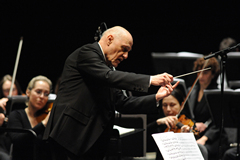| Opera Reviews | 26 April 2024 |
Oberto blossoms under conductor Christofer Macatsorisby Steve Cohen |
|
| Verdi: Oberto Academy of Vocal Arts, Philadelphia January 2012 |
|
|
The company presented four semi-staged performances of Oberto at the Perelman theater of Philadelphia's Kimmel Center, the Grand Opera House in Wilmington, Delaware, and the Haverford School in Haverford, Pennsylvania. Verdi's amazing talent was audible in this first effort. His writing has expansive melodies, vigorous rhythms and excellent contrasting of voices in ensemble. In variance to the operatic giants who immediately preceded him, Verdi created a more rugged, assertive sound. Bellini's and Donizetti's characters, when they are under stress, go into a minor key and sing weepy, droopy laments accompanied by flute. None of this for Verdi's leading men or women! His arias and cabalettas are gratifying to hear and the most outstanding writing is a duet for the soprano and the baritone - the heroine and her father - with a wealth of affection that started a pattern Verdi would use throughout his career, as in his writing for Gilda and Rigoletto or Aida and Amonosro. Oberto contains melodic kernels that blossomed later, as one of its duets presages a tune from Macbeth which he wrote eight years later, and the prelude to Act 2 hints at Simon Boccanegra from 18 years later. An immense amount of credit goes to the AVA's music director, Christofer Macatsoris, for choosing this work and preparing it so well, outpacing other Verdi advocates like James Levine and Riccardo Muti (La Scala Milan has just announced that it will revive Oberto next year). Macatsoris emphasized its flowing lines and its passions. He avoided any hint of oom-pa-pa or of hurdy-gurdy, terms which have been used to denigrate Verdi's early compositions, and which some conductors apply incorrectly to all his early operas. True, the plot does not include any of the marching armies that inhabited later Verdi operas. The story centers on romance and jealousy. The entire cast was well-schooled and talented. Viktor Antipenko was a clarion tenor and Scott Conner a sturdy baritone. Special attention goes to Michelle Johnson, who gave the best performance of her career as Leonora. Previously, Johnson was a fine Alicia in Verdi's Falstaff, but Oberto revealed her ability in a more dramatic role. Her projection in the middle and lower parts of her range was especially strong, where the composer demands power, and this augurs a successful career as a Verdi soprano on the world's stages. Macatsoris conducted an expanded orchestra of 55 players and a chorus of about 30, which included all the AVA resident artists plus alumni and a contingent from the Delaware Opera Company. The singing and playing were expressive and convincing. Excellent visual reactions and movements across the stage gave the production more drama than normal concert presentations. |
|
| Text ©
Steve Cohen Photo © Paul Sirochman |

 The
Academy of Vocal Arts has initiated the Verdi bicentennial, in two senses.
First, the opera was the earliest possible. Second, the anniversary
doesn't come until 2013, so this was a head start towards an important
year.
The
Academy of Vocal Arts has initiated the Verdi bicentennial, in two senses.
First, the opera was the earliest possible. Second, the anniversary
doesn't come until 2013, so this was a head start towards an important
year.





